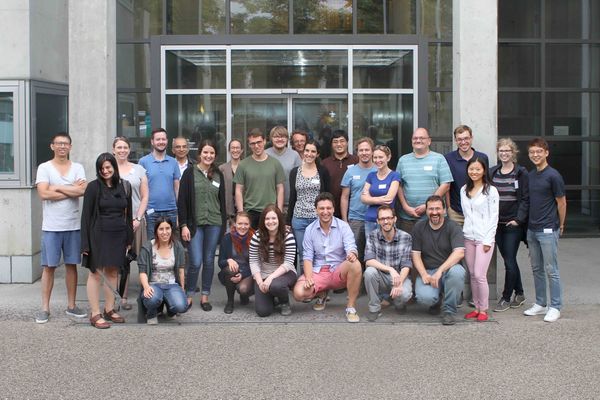Dynamo workshop 2016
Registration for the Dynamo workshop 2016 in Basel (Switzerland) is closed.
The workshop provides hands-on training in all practical aspects of sub-tomogram averaging using our software Dynamo, encompassing all stages of the pipeline: tomogram visualization and archiving, particle picking, averaging, refinement and classification. No previous experience is required. Computing infrastructure is provided in place, and we welcome participants to bring their own data sets to work on them during this three-day course.
Contents
Registration
Regitration for this event is closed.
You'll be ask to confirm your registration by the payment of a fee of 250 CHF. This fee covers lunch and dinners during the workshop, but not the lodgement. Participants are asked to do their own arrangements for accommodation.
Venue
The workshop will take place from the 17th to the 19th of August in the Biozentrum of the University of Basel. Practical lectures are hold in the Room U1075, close to the Pharmazentrum entry in Klingelbergstrasse 70.
Please find here a map for the different events:
- Lunch vouchers are valid in the canteen of the Hospital (close to the Biozentrum)
- Workshop dinner will take place in the Volkshaus Restaurant (Rebgasse 12)
- Interested participants can visit the CINA facilitieson Friday afternoon.
Travel and Lodging
Please note that the travel and lodging are not covered in the workshop registration fee and participants will have to arrange it by themselves. We recommend the following hostels:
- BaselBackPack - info@baselbackpack.com
- Youth Hostel Basel - basel@youthhostel.ch
Computing facilities
Participants will be provided with an individual workstation and with a temporary account on a remote supercomputing system. If you wish to get used to work with Dynamo on your own laptop, you are welcome to bring it. Please, take into account the platforms where it is possible to install the current versions of the code. Also, if you have a access to a supercomputing facility in your home institution, it is a good idea to open there an account beforehand and use it during the course. Dynamo is specially suited to work on GPU systems.
Computer access
Please find details here
Program
The current program can be downloaded from here . We will cover:
- Creation of alignment projects.
- Creation of classification projects.
- Use of supercomputing devices.
- Management of complex tomography projects (Catalogues)
- Particle picking in different geometries: filaments, membranes, vesicles.
Materials: data and walkthroughs
The exact contents can be followed here
Flash presentations
Participants are invited to bring along a short presentation (around 3mins per participant) for the Flash Presentation session on Wednesday. Please send them beforehand or give them to us during the first day, as we need to set them on the same computer.
The order of presentation is as follows:
- Maeva Le Guenne
- Victor Kostyuchenko
- Jeong MinChung
- Anbang Dai
- Peter Kirchweger
- Gergely Gymesi
- Celia Deville
- Aaron Tan
- Mareike Jordan
- Oleksiy Kovtun
- Joseph Beton
- Natasha Burguess
- Christina Heroven
- Desiree Benefield
- Anastasia Gazi
- Pradeep Luther
- Mariano Dellarole
- Francois Bontems
- Natalya Leneva
- Julia Peukes
- Stephanie Sigmund
Organizers
Daniel Castaño-Díez, BioEM lab, University of Basel, Switzerland.
Mikhail Kudryashev, MPI for Biophysics, Frankfurt.
Henning Stahlberg, C-CINA, University of Basel, Switzerland.
Administration
Karen Bergmann, C-CINA, University of Basel, Switzerland.
Instructors
Daniel Castaño-Díez, BioEM Lab, University of Basel, Switzerland.
Mikhail Kudryashev, MPI for Biophysics, Frankfurt.
Alex Noble, New York Structural Biology Center.
Sai Li, University of Oxford, UK.
Wan Jing, University of Basel, Switzerland.
Sponsors
Biozentrum of the University of Basel.
CSCS the Swiss Center for Scientific Computing.
ARC Supercomputing Center of the University of Oxford.
